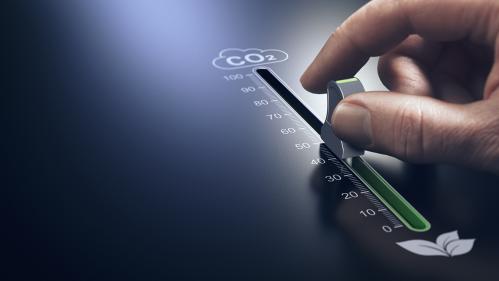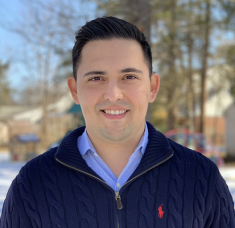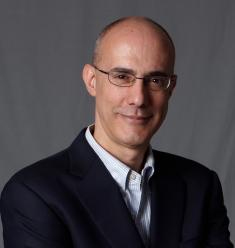Rutgers Startup Queens Carbon Strives to Eliminate Industrial Carbon Emissions

In a world where human and industry activities keep steering climate change, a Rutgers startup aims to make cement manufacturing carbon-neutral while decreasing CO2 emissions.

Queens Carbon was founded by Daniel Kopp, who received his BS, Masters, and PhD from Rutgers, The State University of New Jersey, along with School of Engineering Distinguished Professor Richard Riman and entrepreneur David Gersholowitz. Queens Carbon is based on technology invented by Kopp and Riman as part of Kopp’s PhD thesis while working in Riman’s lab. Rutgers Office for Research executed the exclusive license between the university and the company.
Queens Carbon’s patented method uses hydrothermal technology that allows for a 1,000oc reduction in the heat required to produce cement, which decreases CO2 emission. Cement production has two chemical reactions: calcination, which removes CO2 from limestone, and the solid-state formation of the cementitious phases, conducted at a process temperature close to 1500˚C. The coupling of the two reactions creates a material known as ‘clinker,’ which is ground into the cement powder routinely used in concrete work. The new technology unifies the calcination, solid-state reaction, and grinding into a single chemical process.
“Our technology can accomplish two important climate change initiatives: decarbonization of cement and concrete as well as carbon removal,” said Kopp. “We have a proprietary catalyst based on hydrothermal technology that allows us to drop the 1,500oC temperature to 500oC, which results in lower emissions and saves a lot of energy! Our materials are called silicates and can be used in cement applications to absorb CO2 directly from the air.”

“The founding of Queens Carbon is a testament to the power of basic research by graduate students to accelerate the discovery of new technology,” said Riman. “The basic research that led to the formation of Queens Carbon is a culmination of 37 years of advancement in thermochemical database development and computational methods, as well as new insight into hydrothermal reaction kinetics and crystal growth.”
“Cement is unique in that it is important for infrastructure around the world, but its production process has a profoundly negative impact on climate change,” said Deborah Perez Fernandez, Executive Director of Rutgers Technology Transfer, the department of the Office for Research that negotiated and executed the license between the university and the company. “Queens Carbon, and the technology it is founded upon, hopes to bridge that gap and make cement manufacturing carbon neutral.”
Concrete is the second-most widely used substance on Earth, according to a report conducted by The Royal Institute of International Affairs, and its production process is believed to be responsible for 8% of the world’s CO2 and almost 10% of the world’s industrial water use. With an eye on addressing climate change, Kopp and Riman developed several industrial decarbonization technologies at Rutgers. However, they are directing their efforts at the largest emitter: the cement and concrete industry.
After the decision was made to form Queens Carbon, the company was able to launch thanks in part to a grant from the Breakthrough Energy Fellows program, which was established to “support the world’s best and brightest innovators as they develop new technologies that significantly reduce carbon emissions and help the world get to zero by 2050.” Queens Carbon was selected from a large pool of applicants worldwide following a rigorous selection process. It received the necessary funding to go out independently, build its own laboratory, and hire full-time employees.
“To proceed with the fellowship, we had to form the company and license the technology officially. Fortunately, the Office for Research’s Technology Transfer team was very understanding and moved fast to accommodate the deadlines we were under.” said Gersholowitz, the company’s COO.
The company was also helped by participating in the I-Corps program, of which Rutgers is a part of the Northeast Hub. Kopp explained, “[the program] provided external feedback through conversations, technology presentations, customer discovery, and engaging with people outside of academia. I-Corps gave us a better understanding of the field and how we can refine our language, which helped prepare us for the actual business, partnership, investment, and advisory meetings.”
Part of its pitch to investors and companies is that Queens Carbon’s patented approach will reduce the energy consumption for both carbon capture and carbon-neutral cement production as well as the cost.
“Our technology will create cement that does not pollute the environment, has performance parity, and most importantly for commercial deployment, has the same or lower cost,” said Kopp. “If we can show cement companies that our process positively impacts their bottom line without sacrificing the other two factors, I think we'll be taken seriously, including capital cost. Companies won’t be interested if they have to upend their supply chain or abandon billions of dollars’ worth of capital equipment. But we believe our technology can work within the existing framework, create the same or better material, at a better or similar cost.”
Queens Carbon, named for Queens, NY (where Kopp grew up) and the original name for Rutgers (Queens College), now has its facility and is building a prototype. From there, it will look to create partnerships to build a pilot plant, followed by a full-scale demonstration plant.
“Queens Carbon is investing in people, technology, and ideas, which include academic institutions, to drive our technology to industrial scale,” added Kopp. “Everything we do aligns with our mission of decarbonizing the planet.”
Queens Carbon is one of 102 active Rutgers startups launched with help from the Office for Research as part of its mission to support the research, scholarship, and creative endeavors of all Rutgers faculty. Learn more by visiting research.rutgers.edu.



